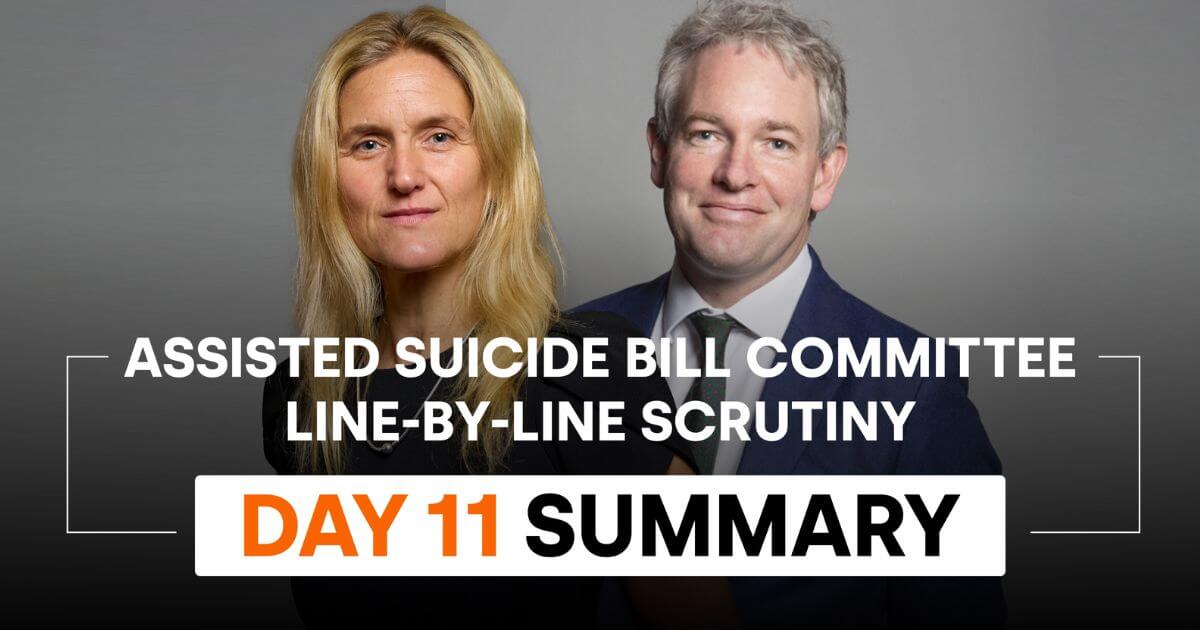- Yesterday’s final day of Committee Stage was a marathon, continuing well into the night.
- Despite previous criticisms that lengthy sittings are not conducive to detailed scrutiny, the Committee finally wrapped up shortly before 12.30 am.
- The morning session was taken up with a discussion of the relationship between assisted suicide and the NHS, with Bill opponents pointing out that an 11th hour amendment tabled by Kim Leadbeater would transform the founding principles of the NHS, turning the NHS into a ‘National Death Service’.
- Throughout the day, concerns were raised that doctors and private companies could profit from assisted suicide services and may even be incentivised to approve requests. However, amendments to prevent this were, disturbingly, rejected.
- Remarkably, an amendment prohibiting doctors from advertising or promoting assisted suicide services was also rejected.
- A big moment came late in the day when the Committee, against Leadbeater’s will, voted for Senedd approval to be necessary before the Bill could be implemented in Wales. The Senedd voted against assisted suicide in October.
- A late amendment that increased the period before which the Bill must be implemented after it becomes law made front-page headlines: implementation could now be delayed for up to four years, meaning it is now possible the Bill would not come into effect until after the next General Election. Bill supporters appeared unhappy about this development and the possibility of assisted suicide becoming an election issue: what are they afraid of?
- Away from the Committee, there was controversy, as it emerged that Kim Leadbeater had misled MPs in an email sent on Sunday evening, wrongly citing an old survey to suggest support for assisted suicide had remained stable since Second Reading.
- Back at Committee, MPs continued to express concerns about the ongoing lack of clarity concerning how assisted suicide would be implemented and the bypassing of Parliament, which would leave ministers to make vital decisions via regulations using ‘Henry VIII powers’.
- Bill supporters seemed rattled throughout the day, with one MP dismissing legitimate concerns expressed by Danny Kruger as ‘scaremongering’ on three separate occasions. They appeared to have run out of arguments, resorting to rudeness at times.
- The language of the Bill sponsor and ministers again raised questions about government neutrality and whether the claimed desire for robust safeguards is sincere, while legitimate interventions from Bill opponents were not always welcomed.
- Amendments to introduce reasonable safeguards continued to be rejected, as they have been throughout Committee Stage.
- Yesterday, these included amendments to ensure doctors would have to flag ‘notifiable events’, that annual reviews and statistics would need to be published regarding assisted suicide provision and that the assisted suicide industry would be prevented from ‘marking its own homework’. There seemed little desire for transparency or accountability.
- Amendments that had been debated in previous weeks were voted on and rejected, including proposed protections for hospices and care homes to prevent discrimination if they were not willing to assist with the provision of assisted suicide, and a requirement for the proposed ‘death panels’ to have to be sure of a person’s eligibility ‘beyond reasonable doubt’ before they could approve a request to die.
- Shortly before the Committee rejected an amendment to ensure assisted suicide could not be classed as a medical treatment, the masterful Danny Kurger (@danny__kruger) closed Committee Stage with a powerful and moving speech, lamenting the Bill’s potential to abandon our ethical tradition and its conflict with the Hippocratic Oath.
As the flawed and unbalanced Committee Stage comes to an end, it is clear that the Bill is full of holes, and supposed safeguards are anything but robust: we still have little clarity about how assisted suicide would be implemented, many dozen sensible safeguards to explicitly protect vulnerable groups have been rejected and key questions have been left for ministers rather than Parliament to decide.
The Bill’s flagship safeguard, High Court oversight, has been scrapped and it is now evident that someone could access assisted suicide if they felt they were a burden on their loved ones, and even if they were not in pain. Danny Kruger, Rebecca Paul, Sarah Olney, Naz Shah, and others have been the heroes of the hour, working tirelessly to painstakingly shine a light on the many dangerous components of this Bill, which MPs must now reject at Third Reading.

